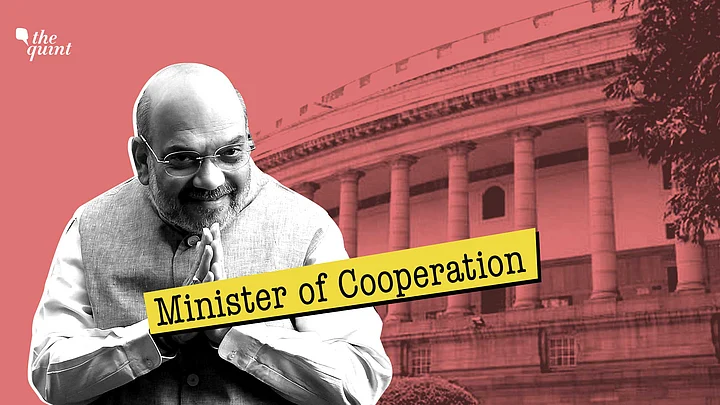The creation of the Ministry of Cooperation on 6 July signalled the imminent cabinet reshuffle that followed a day later.
The induction of 36 new faces, seven promotions and 12 resignations hogged headlines and editorials applauded or disputed Team Modi getting bigger and stronger. Amazement has been expressed at the sacking of Ravi Shankar Prasad and Prakash Javadekar and passing the buck of the COVID fiasco to Harshvardhan. What escaped scrutiny is the new Ministry under the charge of senior-most Cabinet Minister, Amit Shah.
So, what's up?
Welcome to the Ministry of Cooperation
The erstwhile Department of Agriculture, Cooperation and Farmers Welfare comprised 27 divisions, 5 attached offices, 21 subordinate offices, 1 Public Sector Undertaking, 8 autonomous bodies and 2 authorities. Even seasoned bureaucrats often miss the import of this enormous structure.
Whatever is behind the creation of the new Ministry, streamlining and administrative convenience is not the motive. Unusually, very little has been taken out of the existing mandate and assigned to the newly created Ministry of Cooperation
A note in the Allocation of business rules issued by the Cabinet Secretariat says Administrative Ministries will continue to be responsible for cooperatives in their respective sectors. Effectively, the new entity has been saved from managing everyday nitty-gritty. A mission mode approach lends well to such demarcation of policy and administration.
What is the Mission of the Ministry of Cooperation?
As per business rules, the Ministry of Cooperation will administer the general policy of cooperation and coordination, realise the vision from cooperation to prosperity, strengthen the cooperative movement and deepen its reach up to the grassroots. It will promote a cooperative-based economic development model and inculcate responsibility among its members to develop the country.
It will also include creating policy, legal and institutional framework to help cooperatives realise their potential and manage matters relating to National Cooperative Organisations, including incorporation, regulation and winding up of cooperative societies not confined to one state. Finally, it will also administer the multi-state Cooperative Societies Act and personnel training in the sector.
Stated Mandate Doesn't Match Amit Shah's Calibre
As far as mandates go, this one is imprecise and pretty trifling for a minister of Amit Shah's calibre.Two factors mark it.
One is, that with such a broad mandate, he can do pretty much anything he wants. Else, a genuine commitment of the government to the cooperative movement may be about to be unleashed.
The Public Information Bureau (PIB) note from 6 July, issued by the Cabinet Secretariat, states, ' The Central Government has signalled its deep commitment to a community-based development partnership. The creation of a separate Ministry of Cooperation also fulfils the budget announcement made by the Finance Minister.'
Interestingly, however, the 62-page budget speech made by the Finance Minister on 1 February does not mention a separate Ministry of Cooperation or allude to any commitment to community-based development.
From Where Does The Elusive Deep Commitment to Cooperatives Originate?
Even though belated, Prime Minister Modi may be paying tribute to his mentor Lakshmanrao Inamdar, a Sangh leader - popularly known as Vakil Saheb - and a founding father of the RSS-affiliated Sehkar Bharti, which worked for the development of cooperatives in India.
Inamdar is credited with inducting Modi as an RSS balsvayamsewak and becoming his political mentor. He also persuaded Modi to join a BA program in political science. While Modi's commitment to cooperatives is not pronounced, his mastery of politics leaves no one in doubt.
Amalgamation of Deep Commitment to Cooperatives or Plain Politics?
In the wake of electoral setbacks in West Bengal, Tamil Nadu and Kerala and the looming threat of the farmers' agitation on BJP's electoral prospects in the critical states of UP, Punjab and Maharashtra, the setting up of the new Ministry may not be as innocuous as it seems at first sight.
A strategic aspect of the real politics practised by the Modi-Shah duo is dismantling the financial and organisational prowess of the opposition. In most opposition ruled states, there exist potent cooperatives still in the control of opposition leadership.
These cooperatives provide funding and organisational reach to associated political parties. It makes eminent sense to dismantle latent grass-root structures with the potential to mobilise the electorate against the regime at the centre.
With its fluffy mandate, the Ministry of Cooperation is a lethal instrument in deft hands to strike a death blow to what remains of opposition finances and organisation. Time will tell where the deep commitment of the Prime Minister lies, in cooperation or politics of his mentor.
For now, the strategic deployment of three go-to organisational honchos, Dharmendra Pradhan in Education, Bhupender Yadav in Labour and Amit Shah in Cooperation, is no coincidence. A studied plot has been set in motion to manage the disaffection of students, workers and farmers.
Abhi toh party shuru hui hai!
(The writer is a former Member of the Postal Services Board. This is an opinion piece and the views expressed above are the author’s own. The Quint neither endorses nor is responsible for the same.)
(At The Quint, we question everything. Play an active role in shaping our journalism by becoming a member today.)
